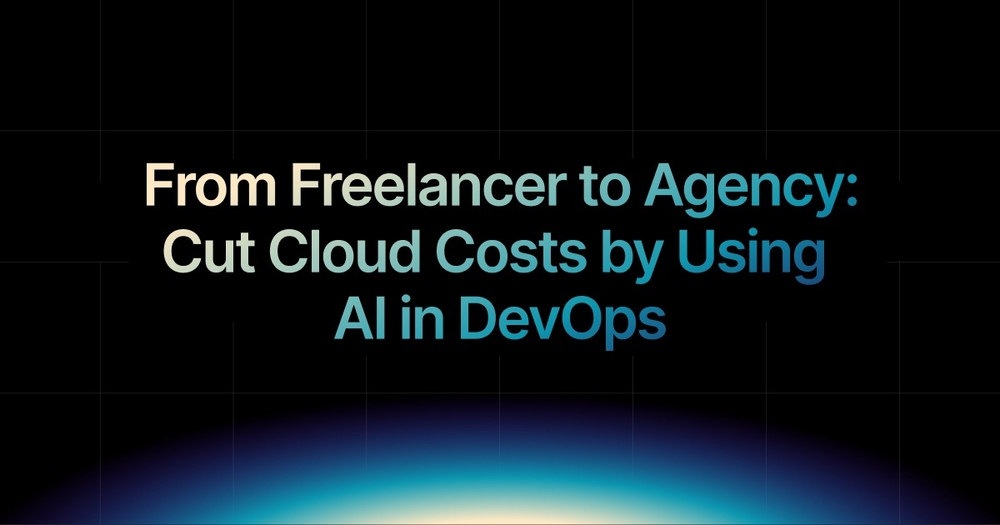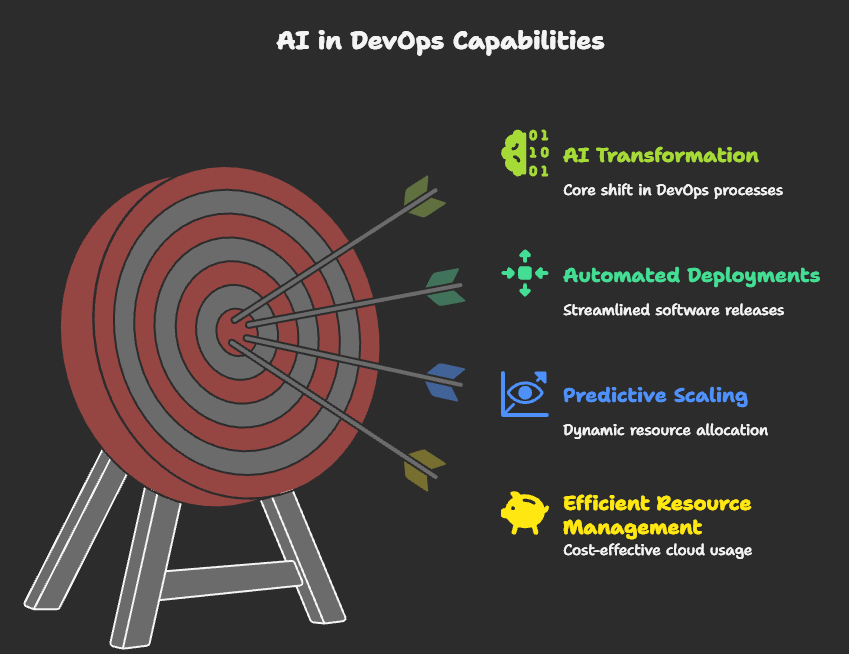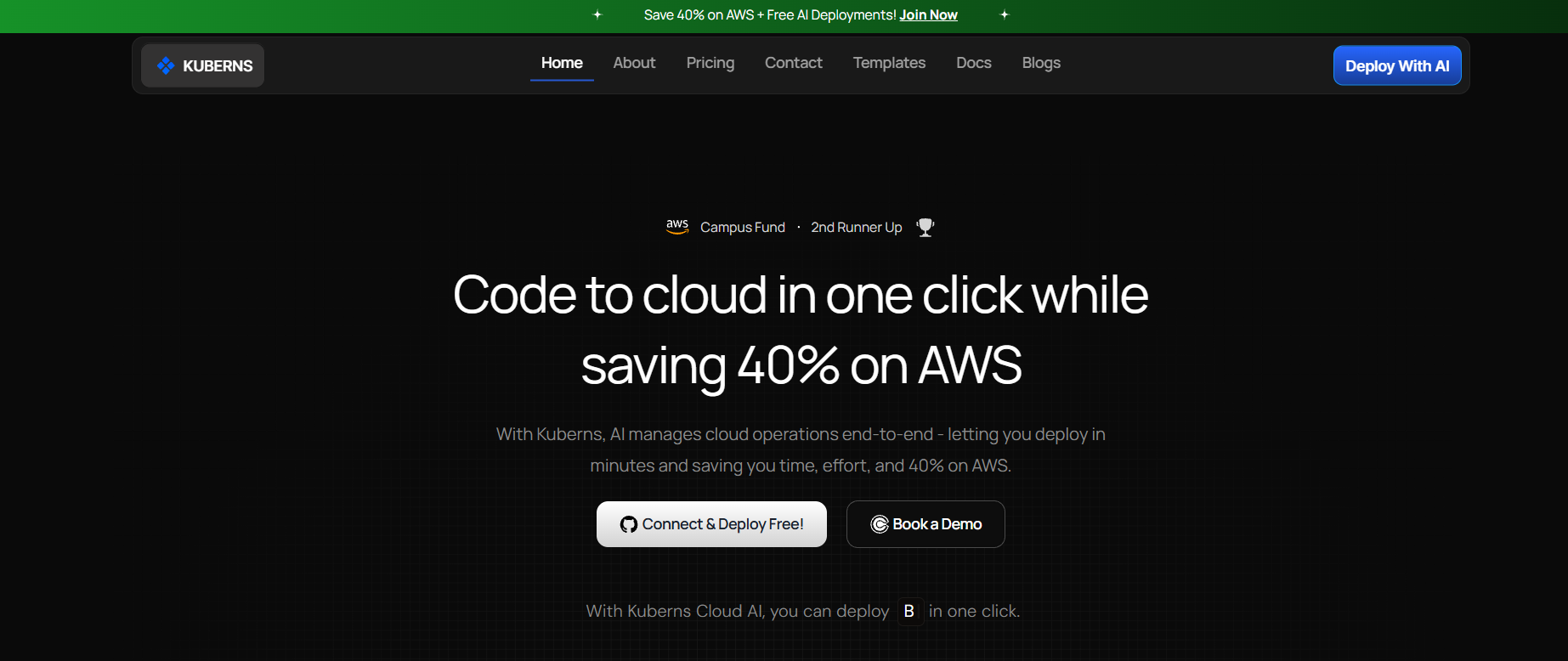Published
- 17 min read
From Freelancer to Agency: Cut Cloud Costs by Using AI in DevOps

Introduction:
Using AI in DevOps is revolutionising how solo freelancers, startups, agencies and large enterprises manage and optimise their cloud costs while accelerating software deployment.
Cloud expenses pose a significant challenge across the board, whether for a freelancer working on limited budgets or an agency juggling multiple client projects.
Traditional DevOps approaches often fall short in controlling costs and scaling efficiently. However, with AI-powered DevOps, businesses of all sizes are turning the tide.
By automating deployments, predicting usage, and optimising cloud resources in real time, AI offers a solution to accelerate deployment speeds, reduce wasted resources, and lower cloud bills, ultimately allowing companies to focus on growth and innovation.
In this article, we’ll explore how AI in DevOps benefits freelancers, agencies, and enterprises, showing how you can harness this technology to achieve faster deployments, cost savings, and greater scalability.
The Cloud Cost Problem Across Freelancers, Startups, and Agencies
Uncontrolled cloud costs are a universal problem, but they manifest differently depending on your business size. From a freelancer’s tight budget to an agency’s complex client environments, poor resource allocation leads to wasted money and performance issues. This margin pressure can stifle growth before it even begins.
Fortunately, many use cases for AI-powered DevOps directly address these financial pains.
On platforms like AWS, AI can analyse your infrastructure, predict demand, and automatically adjust resources. This intelligent automation ensures you only pay for what you use, turning a major cost centre into a strategic advantage.
Let’s look at how this problem affects each type of business.
Freelancers:
As a freelancer, every dollar counts. You operate on tight margins, and unexpected cloud costs can quickly eat into your profits. Managing infrastructure for even small projects requires careful resource allocation, and the time spent on manual configurations is time you are not building features or finding new clients.
This is where AI tools become your most valuable employee.
Can AI help automate routine tasks for DevOps engineers? Absolutely.
AI can handle many of the repetitive tasks that consume your day, from running tests to deploying code. It acts as a virtual assistant, ensuring your deployments are smooth and efficient without constant oversight.
Startups:
Startups exist in a state of rapid growth and high financial pressure. With a high burn rate, every dollar of investor money must be spent wisely. As your user base grows, scaling your infrastructure becomes critical, but this often leads to unpredictable and skyrocketing cloud costs. You need a way to grow your services without your cloud bill growing even faster.
Is AI in DevOps suitable for startups with small teams? It’s not just suitable; it’s essential.
AI-driven platforms give small teams the power to manage complex infrastructure that would typically require a much larger headcount. These tools streamline the entire development process, from code to deployment, enabling faster delivery while maintaining financial control.
Agencies:
For agencies, complexity is the biggest enemy of profitability. You are juggling multiple client projects, each with its own unique environment, tech stack, and deployment needs. This often leads to a bloated and expensive toolchain, inconsistent workflows, and constant firefighting to resolve performance issues. All of this puts immense margin pressure on your business.
So, what are the benefits of AI in DevOps for agencies managing multiple clients?
AI brings standardisation and efficiency to this chaotic environment. It centralises control, allowing you to apply best practices across all client projects from a single platform. This simplifies management and drastically reduces manual effort.
AI-powered DevOps offers several key advantages for agencies:
- Unified Management: Oversee all client deployments from one dashboard.
- Cost Optimisation: Automatically optimise cloud costs for each client, demonstrating clear value.
- Improved Reliability: Proactively identify and fix performance issues before clients notice.
- Streamlined Workflows: Automate deployments and updates, ensuring consistency and speed across the board.
What AI in DevOps Brings to Freelancers, Agencies, and Enterprises?
 AI in DevOps isn’t just about managing cloud resources more effectively. It’s about transforming how businesses deploy and scale their infrastructure, ultimately saving time, reducing costs, and boosting overall efficiency.
AI in DevOps isn’t just about managing cloud resources more effectively. It’s about transforming how businesses deploy and scale their infrastructure, ultimately saving time, reducing costs, and boosting overall efficiency.
By integrating AI tools into your development workflows, you empower your devops teams to move faster, work smarter, and avoid common pitfalls like performance issues.
So, how is AI transforming traditional DevOps workflows?
Instead of relying on manual scripts and reactive alerts, AI introduces a layer of predictive intelligence. It automates complex processes, anticipates problems before they occur, and optimises resources in real-time. This allows you to build more resilient, cost-effective, and efficient systems.
Below, we’ll explore three core capabilities that AI brings to the table.
Automated Deployments:
One of the most significant benefits of AI in DevOps is achieving fully automated deployments. Traditional deployment processes are often manual, time-consuming, and prone to human error. A single mistake can lead to failed deployments, downtime, and hours of stressful troubleshooting.
AI transforms your CD pipelines into an intelligent, self-driving system. It handles everything from code integration and testing to production release without requiring constant manual oversight. This level of automation drastically shortens the software development lifecycle, allowing you to deliver new features to your users faster than ever before.
This directly answers the question, “Can AI help automate routine tasks for DevOps engineers?” Yes, it takes over the tedious and repetitive work of deployments, freeing you to focus on innovation.
With AI managing the pipeline, you can deploy with confidence, knowing that the process is consistent, reliable, and optimised for speed.
Predictive Scaling:
Wasted cloud spend is often caused by static resource allocation. You provision servers for peak traffic, but they sit idle most of the time, costing you money. Predictive scaling solves this problem by using AI to match your resources to your needs in real time.
How does AI-powered DevOps work on platforms like AWS? AI models analyse historical data and current trends to forecast demand.
This dynamic approach, sometimes enhanced with generative AI to model complex scenarios, ensures you are never paying for more than you need. The system intelligently manages your infrastructure, optimising for both performance and cost, so you don’t have to.
Efficient Resource Management:
Effective resource management is the key to controlling cloud costs. Traditional monitoring tools can tell you when a server is busy, but they require you to manually decide what to do about it.
AI-powered optimisation takes this a step further by automating the decision-making process.
AI continuously analyses your entire infrastructure, identifying idle or underutilised resources and safely scaling them down or shutting them off. This proactive approach to resource allocation prevents waste before it accumulates on your bill.
For example, you can automate the task of finding and terminating unused test environments, a common source of cloud waste. This is just one of many repetitive DevOps tasks that can be automated using AI.
By implementing AI-driven best practices, you can see a dramatic difference in your cloud spend.
Practical Benefits Across Freelancers, Agencies, and Enterprises
The theoretical benefits of AI are compelling, but how do they translate into real-world results? The practical use cases for AI in DevOps demonstrate tangible cloud cost savings and dramatically improved development workflows. This technology is not about replacing engineers but augmenting their capabilities.
The impact AI is having on the future job market for DevOps engineers is a shift from manual configuration to strategic oversight.
Engineers who embrace AI tools will become more valuable, as they can manage more complex systems with greater efficiency.
Let’s look at how freelancers, agencies, and startups are already winning with AI.
For Freelancers:
Imagine you are a solo developer juggling three different client projects. Each has its own deadlines and deployment schedule. Manually managing CD pipelines for all three would be a nightmare, leading to long hours and a high risk of errors. Your deployment time would be slow, and you would likely over-provision resources for each client to be safe, inflating costs.
Now, can freelancers really deploy faster with AI in DevOps? Yes. By using an AI-powered platform, you can automate the entire deployment process for all clients. You connect their Git repositories, and the AI handles the rest. It runs tests, provisions the necessary infrastructure, and deploys the code without you lifting a finger.
This automation drastically cuts your deployment time from hours to minutes. At the same time, the platform’s cloud resource optimisation ensures each client’s environment is perfectly sized, lowering their bills and increasing your value proposition. You can confidently take on more work without burning out.
For Agencies:
An agency with ten clients often has ten different ways of doing things. This inconsistency leads to wasted effort, as engineers have to re-learn processes for each project. Streamlining deployments is critical for profitability, but it’s hard to enforce best practices manually across a diverse client portfolio.
This is where AI DevOps becomes a game-changer. An AI-driven platform provides a centralised, standardised workflow for all clients. Instead of building and maintaining separate, complex pipelines for each one, your team uses a single, unified system that automates deployments with one click.
This approach dramatically reduces manual work and ensures every deployment follows your agency’s proven best practices. The platform’s AI also continuously monitors infrastructure usage for every client, identifying opportunities to optimise resources and cut costs. The benefits for agencies managing multiple clients are clear: increased efficiency, better service reliability, and higher profit margins.
For Startups:
For a growing startup, user demand can be a double-edged sword. A successful marketing launch can bring a flood of new users, but if your infrastructure isn’t ready, your site will crash. If you over-prepare, you are left with a massive bill for unused resources. Managing this balancing act manually is nearly impossible for a small team.
This is precisely why AI in DevOps is so suitable for startups. With predictive scaling, the system learns your traffic patterns and automatically adjusts resources to match user demand in real time. When a blog post goes viral, the infrastructure scales up instantly. When traffic subsides overnight, it scales back down to save money.
This intelligent automation gives startups the elasticity they need to grow without fear. It prevents wasted cloud spend, ensuring capital is preserved for development and marketing. By removing infrastructure bottlenecks, AI enables faster delivery of new features, giving you a critical edge in a competitive market.
Why Kuberns is the Ideal Solution for Faster Deployments and Cloud Cost Savings?
 You have seen how AI can transform your operations, but implementing these capabilities often requires stitching together multiple complex AI tools.
You have seen how AI can transform your operations, but implementing these capabilities often requires stitching together multiple complex AI tools.
This is how AI-powered DevOps platforms like Kuberns differ from traditional platforms; they provide an all-in-one solution. Instead of juggling separate monitoring tools and CI/CD pipelines, you get a single, intelligent platform designed for cloud cost savings.
Kuberns was built from the ground up to help freelancers, startups and agencies scale affordably. It integrates cutting-edge AI into every step of the DevOps lifecycle, from code to cloud.
Here is how Kuberns delivers on the promise of faster deployments and lower costs.
Faster Deployments With One-Click Automation
Spending hours on manual work to configure CD pipelines is not a good use of that time. Kuberns replaces this tedious process with a powerful one-click automation. You simply connect your repository, and Kuberns automatically builds and deploys your application.
This system integrates seamlessly with your existing Git workflows. When you push a new commit, Kuberns detects the change and triggers the deployment pipeline. It handles all the underlying complexity, allowing you to deploy new features in minutes, not hours.
By eliminating manual steps, you not only accelerate your delivery speed but also reduce the risk of human error. Deployments become predictable, reliable, and incredibly fast, giving you a competitive advantage and freeing you to focus on building great software.
Smarter Cloud Resource Optimisation
High AWS bills are often the result of paying for resources you are not using. Kuberns tackles this head-on with intelligent cloud resource optimisation. Its AI engine acts as a vigilant cost-saving assistant, working 24/7 to ensure you only pay for what you need.
The platform’s usage prediction models analyse your application’s traffic patterns to forecast demand. This goes far beyond traditional monitoring tools.
It automatically scales down or even hibernates idle resources during off-peak hours, a task that is tedious and often forgotten when done manually. This automated, proactive approach to resource management can dramatically lower your AWS bills by up to 40%. You get the performance you need when you need it and save money when you don’t, all without any manual intervention.
Integrated Toolchain in One Platform
Managing a modern application often requires a dozen different tools, each with its own subscription fee and learning curve. Kuberns simplifies your life by offering a fully integrated toolchain in a single platform. This is a core benefit of how AI-powered DevOps platforms work; they consolidate complexity.
With Kuberns, you get everything you need to build, deploy, and manage your applications without the tool sprawl.
This includes:
- Built-in CI/CD: A complete pipeline for continuous integration and deployment.
- Integrated Monitoring: Real-time monitoring tools to track performance and health.
- Automatic Scaling and Optimisation: AI-driven resource management for platforms like AWS.
- Domains and SSL: Easily manage your domains and secure them with free, auto-renewing SSL certificates.
By consolidating these functions, Kuberns eliminates the need for multiple subscriptions, saving you hundreds or even thousands of dollars per year. You get a streamlined, powerful workflow without the headache of managing a fragmented toolset.
AI-Powered Rollbacks and Safer Releases
Deploying new code always carries a risk of introducing bugs or performance issues. A bad deployment can lead to costly downtime and damage to your reputation. Kuberns minimises this risk with AI-powered safety nets, transforming how you approach releases.
Kuberns’ AI monitors your application’s health during and after a deployment. If the AI’s error detection system identifies a spike in errors or a sudden drop in performance, it can automatically trigger rollbacks to the last stable version. This happens in seconds, often before your users even notice there was a problem.
This intelligent safety feature is a prime example of how AI is transforming traditional DevOps workflows. Instead of a manual, panicked response to a failed deployment, you have an automated system that protects your application and your users. You can release new features with confidence, knowing that potential problems will be caught and corrected instantly.
Get Started with AI-Driven DevOps Using Kuberns
Adopting AI-powered DevOps with Kuberns is designed to be simple and accessible for teams of all sizes, whether you are a solo freelancer, a startup, or a large agency.
The platform’s intuitive one-click automation minimises the complexity traditionally associated with DevOps, so teams can focus on delivering value instead of managing infrastructure.
Getting started is this simple:
- Connect your code: Link your Git repository and let the platform handle the setup.
- Deploy in one click: Ship projects in minutes instead of hours, without writing complex scripts.
- Save on cloud bills: Let AI optimise usage, scale resources automatically, and prevent waste.
- Stay reliable: Benefit from AI-powered rollbacks and integrated monitoring to keep apps stable.
By integrating Kuberns into your workflows, you accelerate delivery, cut cloud costs, and build confidence across project scales with minimal upfront effort.

Frequently Asked Questions
How does using AI in DevOps save both time and money?
A: Using artificial intelligence in your development workflows saves time by automating repetitive tasks like deployments and testing. It saves money by optimising resource allocation, ensuring you only pay for the cloud resources you actually use, thus streamlining the entire software development process.
Can freelancers really deploy faster with AI in DevOps?
A: Yes, freelancers can dramatically reduce deployment time by using Kuberns AI. This platform automates CD pipelines and manages resource allocation, turning a multi-hour manual process into a single click, which frees up valuable time to focus on development and client management.
What are the benefits of AI in DevOps for agencies managing multiple clients?
A: For agencies, AI standardises workflows across all clients, simplifying a complex toolchain. It automatically applies best practices for cloud resource optimisation, proactively resolves performance issues, and allows a small team to deliver high-quality service at scale, boosting profitability.
How does AI in DevOps compare to traditional DevOps tools in terms of cost?
A: While some AI tools have a subscription cost, they deliver significant cloud cost savings by preventing wasted spend on AWS services. Traditional monitoring tools only report issues; AI platforms perform cloud resource optimisation automatically, providing a much higher return on investment.
Is AI in DevOps suitable for startups with small teams?
A: Absolutely. AI is ideal for startups as it allows small teams to manage complex infrastructure efficiently. Use cases like predictive scaling and automated resource allocation help control cloud spend during rapid growth, making it a crucial tool for lean operations.